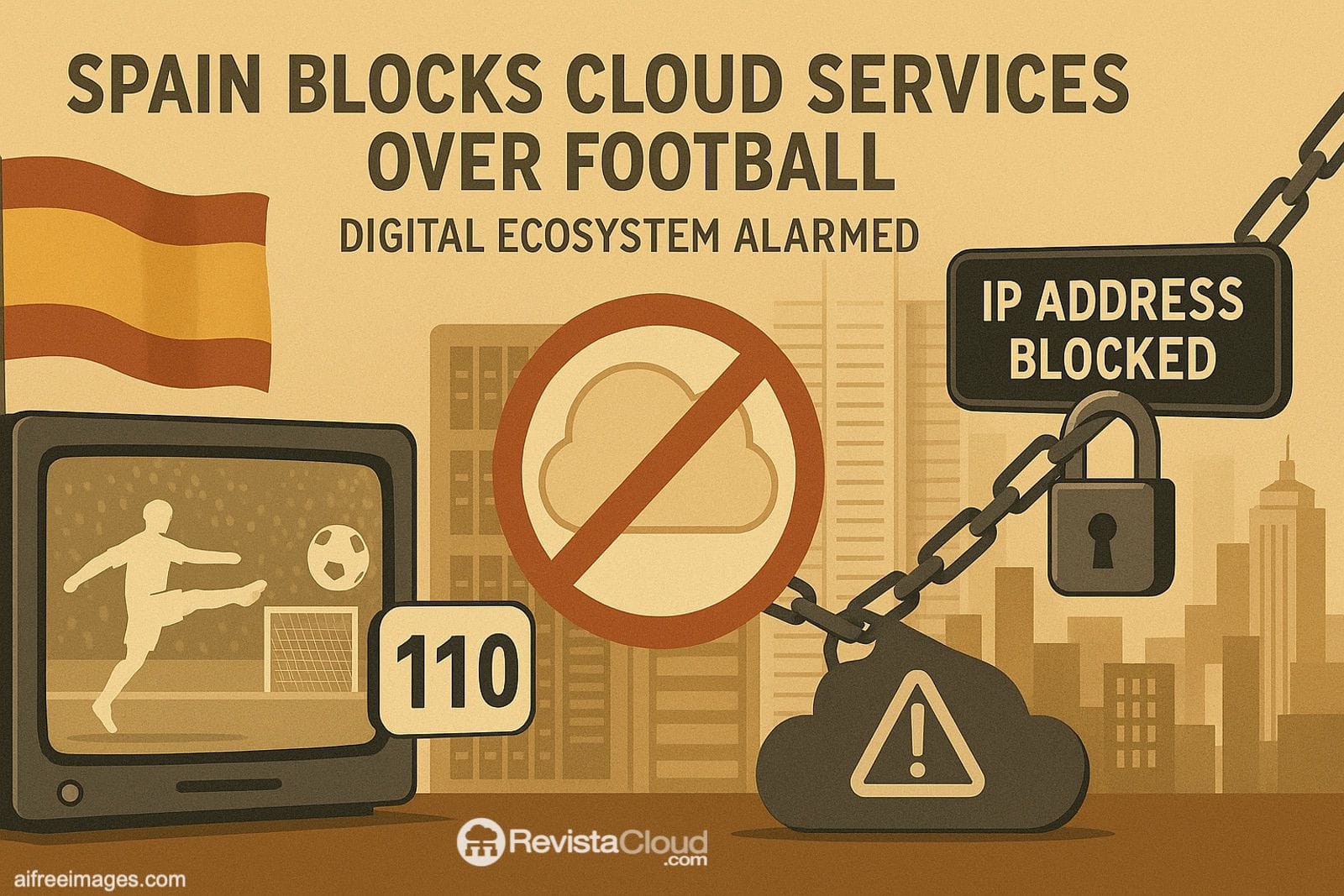International tech companies are denouncing an escalation of technical censorship that jeopardizes Spain’s digital infrastructure and drives away key investments for the country’s technological future.
Spain, which has made notable efforts in recent years to position itself as a tech hub in Southern Europe, is seeing that aspiration waver due to a judicial practice that, under the guise of fighting piracy, is indiscriminately affecting parts of the country’s digital infrastructure. Tech companies like Vercel, Quic.cloud, Cloudflare, BunnyCDN, and even hosting services like GitHub Pages, are experiencing IP blocks from major telecom operators in Spain in order to comply with judicial orders pushed by LaLiga.
What initially began as measures aimed at curbing illegal broadcasting of football matches has, according to the affected companies, transformed into a form of widespread censorship that compromises the stability, performance, and trust of web services across the country.
From protecting copyright to affecting critical infrastructure
The origin of the controversy dates back to an order from the Commercial Court No. 6 of Barcelona, which granted LaLiga authorization to request the blocking of IP addresses associated with websites that broadcast football without authorization. This measure was renewed and expanded in March 2025. However, the scope of the blocking has gone far beyond: the blocked IPs often belong to CDN (Content Delivery Network) services used to host legal applications and websites of all kinds, from media outlets to open-source projects or online stores.
Vercel denounces ‘censorship without accountability’
One of the most noteworthy cases is that of Vercel, a web application deployment platform widely used by developers and companies such as TikTok, Netflix, and GitHub. According to its CTO, Malte Ubl, two Vercel IPs—66.33.60.129 and 76.76.21.142—have been blocked for days by Spanish networks such as Telefónica and Digi, without prior notification or the possibility of appeal.
The CEO of Vercel has joined the criticisms, stating that they are working to restore access to their services “despite the lack of cooperation from those responsible for the blocking.” In their official blog, the company directly accuses LaLiga of using these court orders to impose “technical censorship without oversight or independent review.”
“What began as an anti-piracy measure has turned into an opaque mechanism that disrupts access to legitimate services indiscriminately,” states Vercel.
Quic.cloud disconnects its Spanish nodes
The impact is not limited to Vercel. Quic.cloud, a content distribution network optimized for WordPress and backed by LiteSpeed Technologies, has decided to shut down its nodes in Spain due to the blocking. This means that web traffic from Spanish users is redirected to servers in other countries, increasing latency and harming domestic customers.
“If we cannot guarantee free and reliable connectivity, we are forced to temporarily abandon the region,” explain LiteSpeed representatives.
Cloudflare, GitHub Pages, and BunnyCDN also affected
Other CDN providers and web hosting services have reported similar cases. Cloudflare, one of the pillars of modern internet that protects and distributes content from millions of websites worldwide, has suffered shared IP blocks. This has taken thousands of websites unrelated to piracy offline during sporting events.
Similarly, GitHub Pages, used by developers to publish technical documentation and open-source projects, has been partially blocked during certain time slots coinciding with matches. BunnyCDN, another network popular among small and medium-sized businesses for its good price-quality ratio, has also noticed similar issues.
The consequences: loss of trust and technological exodus
The situation has raised alarms in the Spanish tech ecosystem. Experts and industry associations warn that these massive, opaque blockages violate the principle of net neutrality and send a negative message to international investors.
David Carrero Fernández-Baillo, co-founder of Stackscale (Grupo Aire), a cloud infrastructure company, summarizes it this way:
“If a company cannot guarantee that its services will be available in Spain due to a judicial measure that does not distinguish between legal and illegal, it simply will not deploy its infrastructure here. It’s a loss for everyone involved in the development of new infrastructures in our country. We need more dialogue and common sense.”
Furthermore, users and developers have found themselves without resources to claim redress. IPs are blocked without prior notice, there is no pathway for review or appeal, and ISPs simply comply with court orders without providing public information.
Is this the digital governance model Spain needs?
The Ministry for Digital Transformation and the CNMC have not yet made an official statement. However, voices from the sector are calling for a clearer framework that allows copyright protection without causing massive collateral damage. In fact, media outlets such as television networks, radio stations, and major media are silencing this issue, which should be headline news due to the severity of the situation.
In the meantime, trust in the digital ecosystem is eroding. If Spain wants to consolidate itself as a European digital hub, it needs to guarantee net neutrality, transparency in judicial decisions, and robust digital governance.
And above all, it needs to understand that poor blocking is more harmful than not blocking at all. Because today it is the developers who raise their voices, but tomorrow it could be Spanish companies themselves that suffer the same treatment.
References: Social Media News and Vercel. Free illustration from AI free images.

